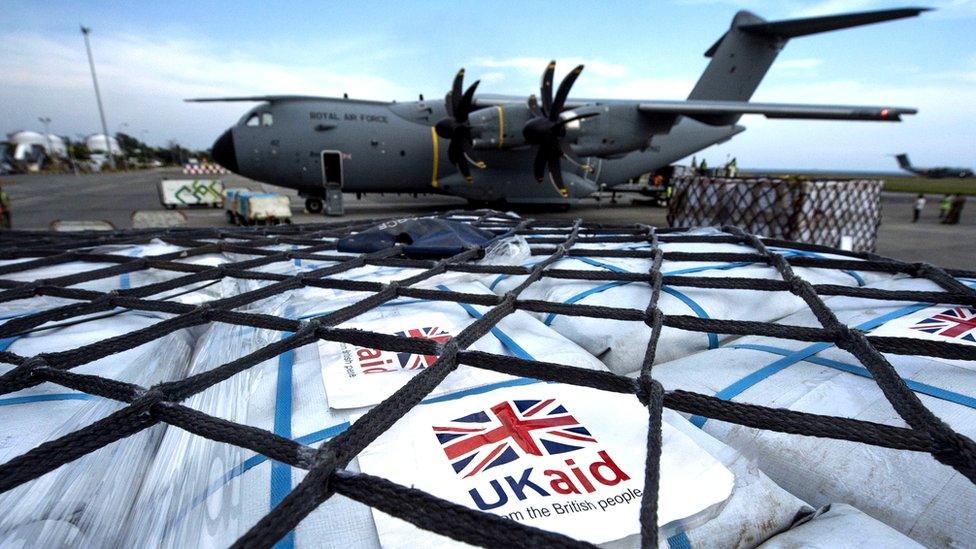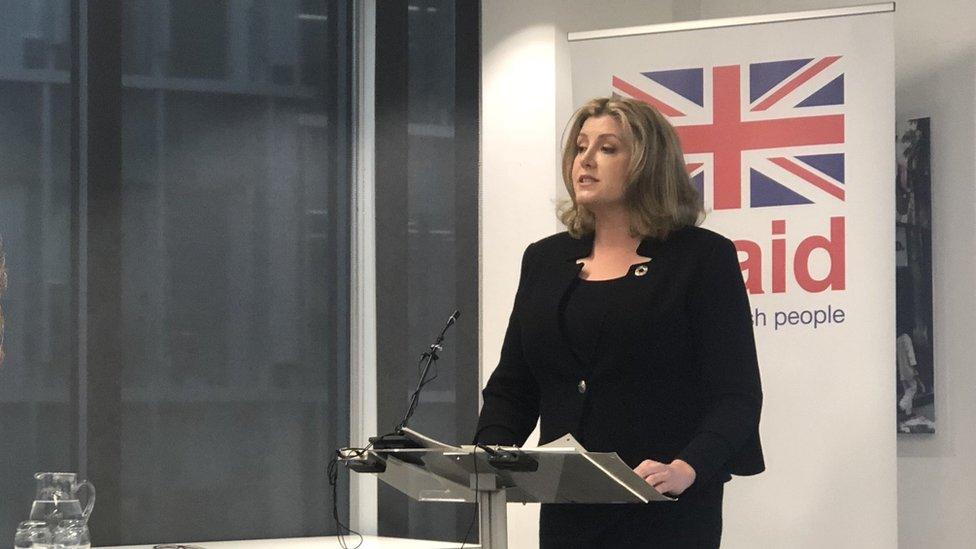Overseas aid: Taxpayers' bill could be cut - Mordaunt
- Published
- comments

Penny Mordaunt said aid from Britain helped humanitarian efforts across the globe, such as after the recent Indonesian earthquake and tsunami
Millions of pounds a year could be cut from the taxpayers' overseas aid bill under changes set out by the international development secretary.
Penny Mordaunt wants profits from development projects to be included in the UK commitment to spending 0.7% of national income on aid.
She also said private investment could "make aid money work twice as hard".
Labour said viewing global poverty as an "investment opportunity" was an "outrageous distortion".
Ms Mordaunt told a news conference that redefining what counts as aid spending could contribute to "reducing the ask on the public purse".
She was speaking at the London offices of CDC, a body funded by the Department for International Development to invest in companies to boost job creation across Africa and South Asia.
As CDC's website puts it: "Making a financial return means we can recycle the money into new investments, to create jobs and pay taxes beyond our involvement."
International rules dictate that this re-investment does not count towards the UK's 0.7% foreign aid commitment, which is enshrined in law.
Ms Mordaunt wants to change that.

Ms Mordaunt said Brexit could offer the UK more flexibility over its aid budget
Responding to an urgent question from Labour, Ms Mordaunt was accused of trying to water down the 0.7% target.
She said the government was committed to the target - but the government "must be sure the British public get a good return on their generosity and compassion".
She said she was not here "to make us feel good about spending aid money", adding that "dogma has no place in this debate" and that the private sector was needed to lift people out of poverty.
Ms Mordaunt also suggested people could use an app to decide which development schemes they wanted their pensions to be invested in.

Changes won't be straightforward
By Chris Mason, BBC political correspondent
In the distant past, when political debate roamed free across a plethora of issues and politicians could complete a sentence without saying Brexit, rows about foreign aid were frequent, and noisy.
And so while Penny Mordaunt's remarks about Brexit are grabbing headlines, her vision for international development should not be ignored. Last year, £13.9bn of taxpayers' money was spent on overseas aid.
It is the law that 0.7% of national income should be spent on aid, meaning the figure rises as the economy grows even if there are public spending cuts happening elsewhere.
The international development secretary explicitly said her plan would involve "reducing the ask on the public purse".
But changing the international rules to allow this to happen won't be straightforward. And while some will cheer the plan, others will ask if the government is running away from its responsibilities.

Earlier she said the UK would have "more flexibility to consider how we use the aid budget", and an opportunity to mobilise private investment to support development.
And she defended opponents of foreign aid, saying Brexiteers and aid sceptics were "not selfish, uncaring little Englanders" but often the most charitable.
Kate Osamor, Labour's shadow international development secretary, said classifying private finance as aid would "entrench inequality", adding: "Poverty is not a commodity."
"This is an outrageous distortion of the country's overseas development programme," she said.
"The Tories' plans to rewrite the international rules on aid and slash billions of pounds of public money will do nothing to end global poverty or reduce inequality."